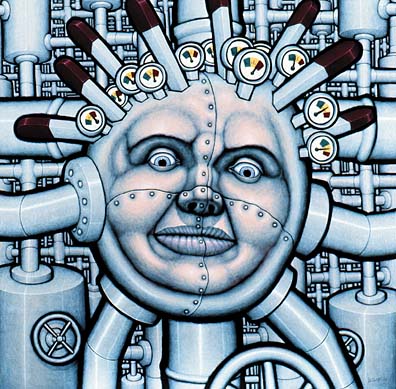INDUSTRIAL SOCIOLOGY
SOC 474
3 - 1- 0 - 4, Prereq. #

Head of Industry III, by Tim Slowinski
Industrialization is one of the most important processes changing the world today. It has the potential of doing both great good and great evil.We must understand what effect our jobs and our work would have on other people's lives. Through this course, we seek a better understanding of what exactly industrialization is, and how it has contributed to building today's world. This would give us an insight into how industrialization has affected our joys and our sorrows, our daily lives and our daily work. We would try to understand how the basic structures of Indian and world society have been changed by it.A special focal point would be the benefits as well as the problems raised by industrialization. We would examine the different paths of industrialization available to us and the implications of each. |
---------------------------------------------------------------------------------------
MAJOR THEMES
THEME |
SESSIONS | ||
| Introduction – outline of course, major themes, forms of evaluation, activities. |
1 |
||
|
Introduction to sociology. Basic contours of the sociological approach. |
1 |
||
|
Key themes in the study of industrial society: summary of main issues from Emile Durkheim, Karl Marx, Max Weber: integration, anomie; alienation, class struggle, transition from feudalism to capitalism; impersonality, rationalization, technical rationality, bureaucratization, etc. |
6 |
||
|
Modernization theory, dependency and world system theories, state-weberian theories. |
6 |
||
|
Different models of state guided growth - USA, UK, France, Germany, Japan, China, USSR |
4 |
||
|
4 |
|||
|
Organizations: the core of modern work. Debates and alternatives. |
6 |
||
|
Late industrial society. Formal knowledge, the consumer society, culture industry, reflexive modernity. |
3 |
||
|
Inequality in the contemporary world. |
4 |
||
|
The future: multiple models of industrialization: collectivist, anarchist, free market, environmentalist, etc. trajectories. |
5 |
||
|
|
|||
ACTIVITIESThere would be a continuous emphasis on examining practical examples. At least one film show and one field visit would be organised. These would concretize what we are discussing in the classroom and help convert the words written in books on industrialization into an actual lived experience. |
|||
ONLINE RESOURCESSome of the online resources are copyright materials, being made available here only for study by the students of the course. A dialogue box will ask for a password, which will be announced in class. |
|||
EVALUATION AND FEEDBACKEvaluation would focus on understanding and not just on memorization. Evaluation and feedback would try to encourage independent and critical thinking, a solid grounding in grass-roots realities and a good grasp of theoretical tools. Projects and assignments would be part of this process. For more details, click here. |
|||
TEXTBOOKS
- Haas, Jeffrey K. 2007. Economic Sociology. London: Routledge. IITK 306.3 H275E